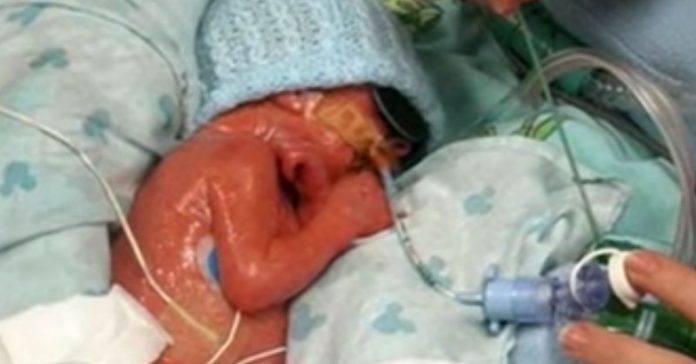Whether you had planned for it, or it happened as a happy accident, or something else altogether, there’s no doubting that after carrying a child for nine months, as a mother you would have developed a close, special bond with your unborn baby.
Some argue this connection between mother and child is magical in nature. And sometimes, the magic in that connection can bring about miracles, especially when your child needs it most.
Whether it was magic or not, the impossible happened anyway for Kate. Having given birth to a pair of twins, you would think that this would be a cause for celebration.
Unfortunately for Kate and her husband, their newborn children (named Emily and Jimmy respectively) were born prematurely at twenty-seven weeks.
Emily was fine, but Jimmy was pronounced clinically dead.

Kate, understandably, found this unacceptable and was inconsolable.
She held onto her baby and instead of returning him back to the nurse chose to hold him in her arms against her bare skin, talking and hugging the small body of her child.
She told him about his sister Emily was doing okay and stroked him, trying her best to tell her baby his name and show him that he was loved.
Out of respect, the hospital staff let her be. This decision may have saved Jimmy’s life, for a few hours later he started moving and sucking on his mother’s fingers, to the surprise of everyone involved.
Trying to manage expectations, the doctors warned the couple that this could simply be a reflex.
But soon it was unmistakable- against all odds, the baby had revived.
This was not an isolated case, and likely will not be the last.
Called Kangaroo Care and known by a few, this is the practice of holding one’s baby with direct skin to skin contact, which has proven itself to have successfully revived many babies thought to be dead upon birth.
This practice is named after the way kangaroos care for their underdeveloped young, also known as joeys.
No larger than a jelly bean after a live birth, joeys must then make the treacherous journey up into their mother’s pouch, whereupon they will latch onto a nipple and stay there until they are fully grown one and a half years later.
They won’t, however, stay in their mother’s pouch for the entirety of their development.

The name Kangaroo Care then comes from how a newborn joey will also rest in an upright position against the chest of its father or mother for about a day, which will then stabilize its breathing rate – among many other beneficial things – while being kept warm by its parent’s fur.
As a marsupial, humans are not exempt from this sort of behavior, and the benefits it brings, including keeping the baby warm and stabilizing its breathing.
It is undeniable the usage of incubators has considerably upped the survival rate of babies, but considering how miraculous Kangaroo Care is, it seems silly that modern practice eschews this practice and opts to put premature babies into an incubator regardless of whether the baby needs it or not.
SEE ALSO:
Why It’s Important To Understand What Happens To Babies When You Keep Them Barefoot
























